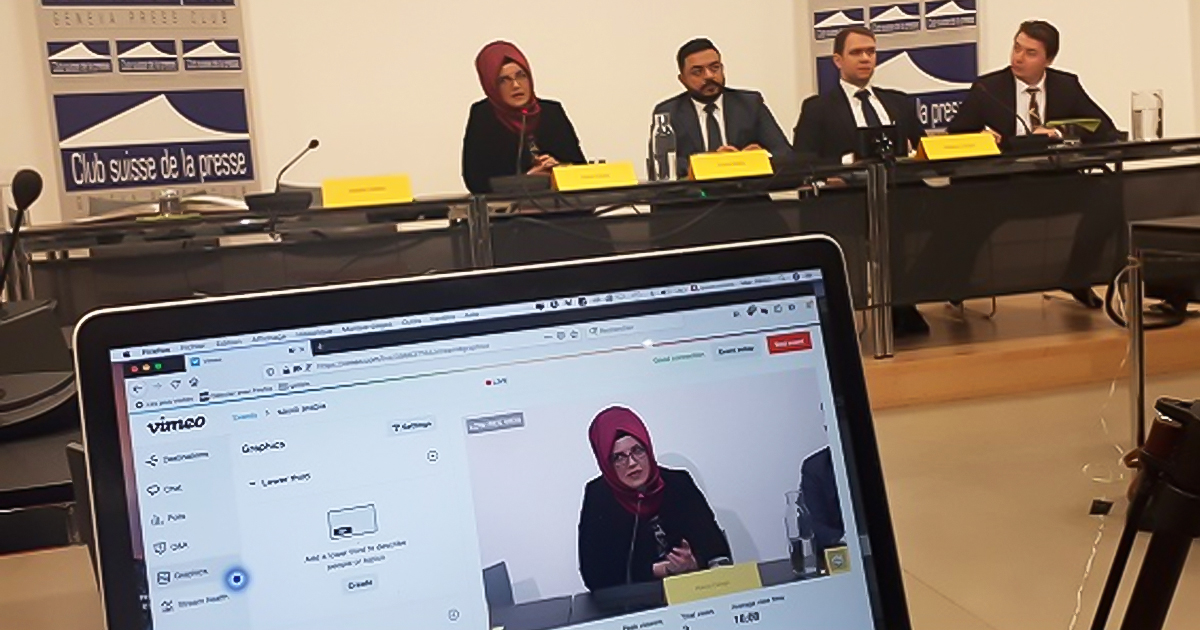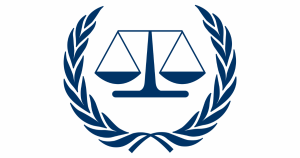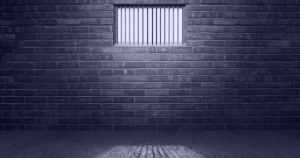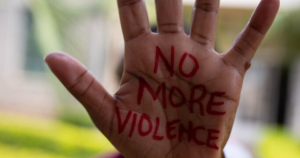Geneva, 10 March 2020
On 10 March 2020, No Peace Without Justice (NPWJ) convened a Panel discussion on “Human rights crisis in Saudi Arabia”, organised with the Geneva International Film Festival and Forum on Human Rights (FIFDH).
Hatice Cengiz, “Justice for Jamal” campaign and fiancé of murdered journalist Jamal Khashoggi; Agnes Callamard, United Nations Special Rapporteur on Extra-Judicial Executions; Abdullah Alaoudh, Senior Fellow at Georgetown University and son of detained Saudi scholar Salman al-Ouda and Matthew Hedges, social scientist formerly arbitrarily detained in the UAE, shared their views on the issue of silencing dissent within Saudi Arabia in a discussion moderated by Ahmed Bedier, President of United Voices. Welcoming remarks were made by Isabelle Gattiker, FIFDH Geneva Director.
Participants expressed their deep concern about the current situation and the implication of the KSA in a pattern of gross human rights violations ending only in impunity, as is happening in the emblematic case of the extrajudicial killing of Saudi citizen, journalist Jamal Khashoggi. They emphasised the lack of accountability and genuine investigations by the Saudi authorities has not only happened in the Khashoggi murder, but also in other cases of violations of the human rights of both Saudi and foreign citizens within and outside the Saudi territory. The fact that the international community appears to condone this situation only gives legitimacy to the regime and spurs further human rights abuses. There is a need for prompt action at the international, national and civil society level to fight this pervading impunity and achieve justice and redress for victims. This requires not only legal but also political change, including:
- The establishment of a UN Special Rapporteur on Saudi Arabia, as a reliable mechanism that could provide special scrutiny, deliver independent observations and report regularly on the human rights situation in Saudi Arabia. Given the lack of effectiveness of the existing international legal framework, the creation of this mandate would represent a response to past and ongoing human rights violations, within Saudi Arabia and outside the country;
- The UN should open impartial investigations into the KSA authorities, including the Royal Family and the Crown Prince, as requested by the UN Special Representative on extrajudicial, summary or arbitrary executions. Investigations should aim at prosecuting and punishing perpetrators, as well as reaffirming the role of international bodies in protecting and promoting the human rights they represent;
- Governments, not just civil society, must take concrete actions to put and keep pressure on the KSA to reverse this situation;
- All relevant actors should use the G20 to create momentum to fight impunity, by keeping accountability high on the international agenda, especially in view of the whitewashing undertaken by the Saudi Government to legitimise its authority;
- Governments should enact and enforce targeted sanctions at the highest level, especially in relation to the threats and violence against journalists, as an effective means for delivering accountability and preventing violations;
- Everyone must maintain awareness and positive action to keep fighting for fundamental rights and freedoms in Saudi Arabia and everywhere, and to bring the Saudi government to face accountability.
Press Clipping
- Le Temps: https://www.letemps.ch/monde/agnes-callamard-agissements-riyad-ont-consequences-nos-democraties
- Libération: https://www.liberation.fr/planete/2020/03/10/l-onu-est-beaucoup-trop-politisee-pour-mener-une-veritable-enquete-sur-l-assassinat-cible-de-jamal-k_1781238
- Al-Manar: https://english.almanar.com.lb/961171
- RFI: http://www.rfi.fr/en/wires/20200310-high-time-un-act-over-khashoggi-killing-says-fiancee
- i24News: https://www.i24news.tv/fr/actu/international/1583864968-affaire-khashoggi-il-est-grand-temps-que-l-onu-agisse-exige-sa-fiancee
- Le Quotidien Indépendant Luxembourgeois: https://www.lequotidien.lu/monde/khashoggi-il-est-grand-temps-que-lonu-agisse-exige-sa-fiancee/
- Anadolu agency: https://www.aa.com.tr/en/europe/g20-used-by-saudis-to-build-legitimacy/1761551




